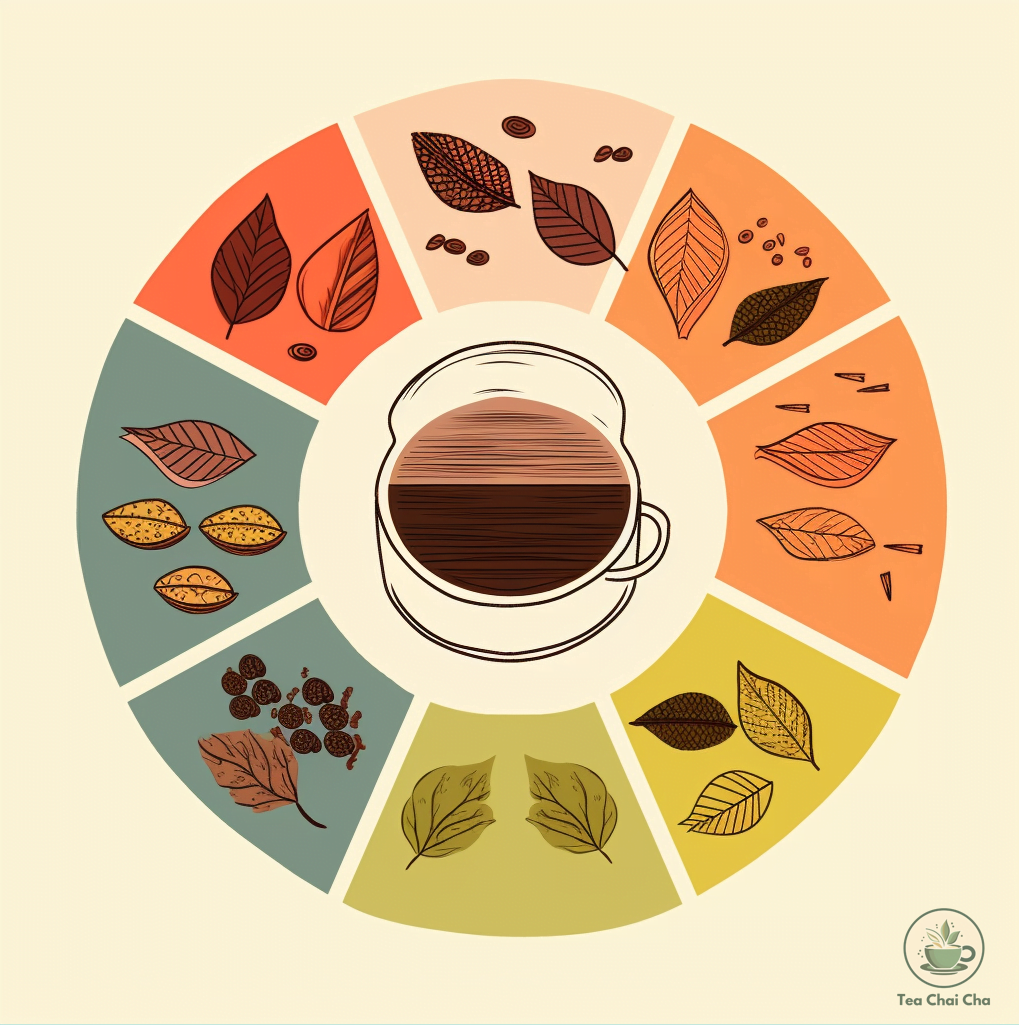So, you know how Thai tea has become quite popular these days, right?
It’s that delicious and colorful drink you often see people sipping on in restaurants and cafes.
But here’s a question that might have crossed your mind: does Thai tea have caffeine?
Thai tea have 20-60 mg of caffeine in an 8 oz. cup due to black tea usually used in the brew.
In this post, we’ll explore the caffeine content in Thai iced tea and Thai milk tea, and compare it with other drinks like coffee.
We’ll also see how the caffeine levels differ in various thai types of tea, from green tea to black tea, and even chai tea.

What is Thai Tea?
Thai tea or Cha Yen is a flavorful beverage originating from Thailand.
It features a vibrant orange hue and a sweet, creamy taste that makes it stand out from other teas.
You’ll find Thai tea incredibly refreshing, especially when served over ice on a hot day.
To make Thai tea, you can brew strong black tea leaves, giving it a robust base.
Then, you can sweeten it with sugar and enrich it with generous amounts of sweetened condensed milk.
It creates that creamy and sweet flavor you’ll adore.
Some recipes might even add spices like star anise, crushed tamarind, or a hint of orange blossom water, adding a unique twist to the taste.
When you try Thai tea, you can’t resist its allure.
Street vendors, restaurants, and cafes throughout Thailand serve this fantastic beverage.
It’s a traditional Thai drink and pairs wonderfully with spicy and flavorful Thai dishes.
Beyond Thailand, Thai tea has gained popularity worldwide.
You’ll find it in various forms, such as Thai tea lattes and those delightful boba (bubble tea) versions.
Does Thai Tea Have Caffeine?
Yes, Thai tea does contain caffeine. The caffeine in Thai tea primarily comes from the black tea used as its base.
Black tea is known to naturally contain caffeine, and when it’s brewed to make Thai tea, the caffeine is retained in the beverage.
The exact amount of caffeine in Thai tea can vary depending on factors such as the type of black tea used, the brewing method, and the serving size.
However, on average, an 8-ounce serving of Thai tea may contain around 20-60 milligrams of caffeine.
So, if you’re considering enjoying a cup of Thai tea, be aware that it does have caffeine.
If you are sensitive to caffeine or prefer to limit your caffeine intake, you may want to consume it in moderation.

Caffeine in Thai Iced Tea
A typical serving of quality Thai iced tea may contain around 20-70 milligrams of caffeine in an 8-ounce cup.
The strong black tea used as the base for Thai iced tea is a natural source of caffeine.
Additionally, the tea is typically brewed to be robust, which means it will have a higher caffeine content compared to milder tea varieties.
The exact amount of caffeine in Thai iced tea can vary depending on factors such as the type of tea leaves used, the brewing time, and the proportion of tea to other ingredients like sweetened condensed milk.
Caffeine in Thai Milk Tea
When it comes to Thai milk tea, the caffeine content remains the same. It ranges from around 20 to 60 mg, depending on how it’s made.
Curious about how much caffeine in Thai tea boba?
Well, the answer stays the same, as most of the caffeine comes from Thai tea base.
The good news is that the milk used in Thai tea, whether it’s whole, condensed, or evaporated, and boba pearls won’t add any caffeine to the mix.
So, if you’re trying to watch your caffeine intake or simply prefer a lower caffeine option, you can still enjoy the creamy goodness of Thai tea without worrying about any additional caffeine from the milk.
Now you have the flexibility to adjust your Thai tea just the way you like it (with ice or with milk).
Whether you want a bit more of that energizing caffeine kick or a milder version, the choice is all yours.
Green Thai Tea Caffeine
Green Thai tea, just like other types of green tea, contains caffeine.
However, the caffeine content in green Thai tea is generally lower than that of black Thai tea or coffee.
On average, an 8 oz cup of green Thai tea may contain around 20-45 mg of caffeine.
The exact amount can vary based on factors such as the brand of tea, the brewing time, and the specific type of green tea leaves used.
Green tea is renowned for its numerous health benefits and is known for being a more mellow and soothing source of caffeine compared to coffee.
Its caffeine content can still provide you a gentle boost of energy without the jitteriness that some people experience with higher-caffeinated beverages.
Caffeine in Thai Tea vs. Coffee
When comparing caffeine in Thai tea vs. coffee, it’s essential to note that coffee generally contains more caffeine than Thai tea.
On average, an 8 oz cup of Thai tea can have around 20-60 mg of caffeine, as we discussed earlier.
In contrast, an 8 oz cup of regular brewed coffee typically contains approximately 95 mg of caffeine.
This means that coffee packs a more significant caffeine punch compared to Thai tea.
Of course, these values can vary depending on factors like brewing strength and the specific type of coffee or Thai tea used.
But as a general rule, if you’re looking for a beverage with a higher caffeine content, coffee would be your go-to choice.
However, if you prefer a milder caffeine boost or simply love the unique flavors of Thai tea, it remains a delightful option to enjoy throughout the day.

What Affects Thai Tea Caffeine Content
In Thai tea, several factors influence the caffeine levels, resulting in variations in the overall caffeine content.
Let’s explore some key factors that play a role:
1. Type of Tea
Thai tea makers use black tea leaves as the base, and the caffeine levels can vary based on the specific variety of black tea they choose.
2. Brewing Time
When you steep the tea leaves in hot water, the duration of brewing affects the caffeine extraction.
Longer brewing times yield higher caffeine content, while shorter times result in a milder brew.
3. Tea-to-Water Ratio
The amount of tea you use relative to the water can impact the caffeine concentration.
Using more tea leaves in proportion to the water will generally result in higher caffeine levels.
4. Caffeine in Tea Variants
Some Thai tea recipes include other ingredients like spices or flavorings.
Although these additions don’t directly contribute to caffeine content, they can influence the overall taste of the tea.
5. Milk and Sweetener
Adding sweetened condensed milk, regular milk, or other sweeteners to your Thai tea doesn’t affect the caffeine content directly.
However, they can influence how your body experiences the caffeine.
For example, the presence of milk might temper the immediate effects of caffeine for some individuals.
6. Type of Thai Tea
You can find Thai tea in various forms, such as loose-leaf tea, tea bags, or ready-made mixes.
The caffeine content may differ based on the specific type and brand of Thai tea you choose.
7. Serving Size
Remember that the caffeine content will vary based on the size of your Thai tea serving.
Larger portions will naturally contain more caffeine than smaller ones.
8. Individual Variations
Keep in mind that people’s sensitivity to caffeine can differ significantly.
You might feel the effects of caffeine more strongly than others, so it’s essential to know your own tolerance.

How Caffeine in Thai Tea Affects Your Body
If you’re all about that Thai tea life or just curious, you got to know how that caffeine in your favorite brew works its magic on your body.
It’s gonna make you appreciate this awesome drink even more, we promise!
Caffeine’s Stimulating Effects
Thai tea’s got this magical ingredient called caffeine, a total natural stimulant!
When it hits your system, it’s like an alarm clock for your brain, making you super alert and killing your fatigue.
Your heart’s going to race like it’s running a marathon, and your mood’s going to be off the charts, all thanks to this awesome Thai tea buzz.
And here’s the best part – your brain’s going to be on awake!
Yes, cognitive function and physical performance are going to level up like you just found some secret cheat code.
So whether you’re just starting your day or need a kick in the afternoon, Thai tea’s got your back with that exhilarating rush!
Potential Side Effects of Consuming Too Much Caffeine
Sipping on some coffee or energy drinks in moderation can be pretty sweet, no doubt!
But don’t forget, going overboard with that caffeine stuff ain’t gonna do you any favors.
Too much of that jolt can mess you up big time, leaving you with insomnia, feeling all jittery, heart racing like it’s in a marathon, and an upset stomach that’s just plain rude.
I bet you don’t want to see those muscles of yours trembling like a leaf in the wind.
So, you have to be mindful and enjoy that caffeine buzz responsibly.
-> Healthy limits for caffeine consumption
The FDA suggests a maximum daily intake of 400 mg of caffeine for most adults, equivalent to roughly four to ten cups of Thai tea.
However, individual tolerance to caffeine varies, and some may experience side effects even within this limit.
Thai Milk Tea Recipe
Recipe by Tania Faysal4
servings5
minutes10
minutesAuthentic Thai Milk Tea is a delightful and creamy beverage made with strong black tea, sweetened with condensed milk, and served over ice for a refreshing and flavorful treat.
Ingredients
1 cup of strong black tea leaves
4 cups of water
3/4 cup of granulated sugar
1 cup of condensed milk
1/2 cup of evaporated milk
Ice cubes for serving
Directions
- Boiling the tea: Start by brewing the black tea. Bring the water to a boil, add the tea leaves, and let it simmer for about 5 minutes.
- Adding sweeteners and flavors: Strain the tea leaves and pour the hot tea into a pitcher. Stir in the sugar until it completely dissolves, then add the condensed milk and mix well.
- Cooling and serving: Let the tea cool down at room temperature, then refrigerate it for about 2 hours. Serve it over ice, topping each glass with evaporated milk.
Also read – What Does Thai Milk Tea Taste Like?
Thai Tea Brewing Process
The brewing process plays a critical role in determining the caffeine content of your tea.
A longer steep time and higher water temperature extract more caffeine.
If you’re sensitive to caffeine, consider reducing the steeping time or using slightly cooler water.
Variations? Substitute half-and-half with other types of milk like almond, soy, or oat.
For a vegan version, use a plant-based sweetener and dairy-free milk.
You’ve successfully brewed an authentic Thai tea. Now let’s plunge into our main discussion—caffeine.
4 Tips for Reducing Caffeine in Thai Tea
As you know, many factors can influence the caffeine content in Thai tea.
Based on that, I have some easy tips for you!
1. Choose Your Tea Leaves Wisely
Different tea types contain varying levels of caffeine.
For instance, decaf black tea or green tea leaves have less caffeine compared to their regular counterparts.
By consciously selecting your tea leaves, you can significantly impact the caffeine content of your Thai tea.
- Tip: Look out for decaffeinated versions of black tea, the primary tea base in Thai tea.
2. Adjust Your Brew Time and Temperature
The length of brewing time and the temperature of the water are two key factors that influence caffeine extraction.
The longer and hotter the brew, the higher the caffeine content.
Use thermometer to check the right temperature as we explained in Tea Accessories and Their Uses.
- Tip: To reduce caffeine content, try reducing the brewing time or using slightly cooler water.
3. Control the Quantity of Tea Leaves
The amount of tea leaves you use when making Thai tea also determines its caffeine level.
More tea leaves mean more caffeine in your cup.
- Tip: If you want less caffeine, simply use fewer tea leaves during preparation.
4. Experiment with Milk and Sugar
While milk and sugar don’t directly reduce the caffeine content, they can help dilute the tea, resulting in a less caffeinated beverage.
- Tip: Adding more milk or sugar can make your Thai tea less potent, which may be beneficial for those sensitive to caffeine.
Remember, everyone’s caffeine sensitivity is different.
These tips should help you adjust your Thai tea preparation to suit your personal needs and preferences.
Enjoy the process of experimenting and finding your perfect brew!
Caffeine in Other Teas
Frequently Asked Questions (FAQs)
Is Thai tea caffeine-free?
Traditional Thai tea, made from black tea leaves, contains caffeine. However, caffeine-free options are available, such as herbal or rooibos Thai tea.
How much caffeine in Thai iced tea?
Thai iced tea typically contains around 20-60 mg of caffeine per 8-ounce serving, depending on factors such as the amount and type of tea leaves used.
Does Thai tea powder have caffeine?
Yes, Thai tea powder, which usually includes black tea, contains caffeine. The exact amount can vary based on the product and preparation.


